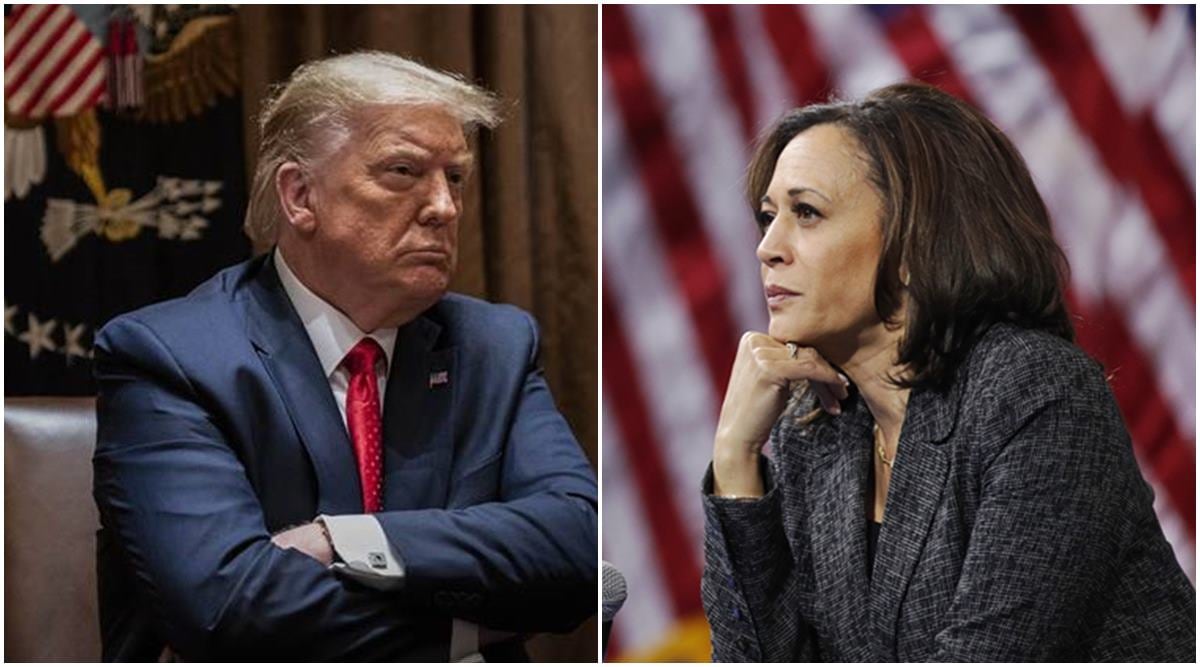Vice President and Democrat nominee, Kamala Harris, has been speaking about the need to "move America forward" and to "restore the American Dream", which, I think, we can all agree, are worthy (albeit unrealistic) goals. Of course, the underlining message is that former President Donald Trump is somehow personally responsible for throwing the switch that put our "democracy" in peril . Lastly, Ms. Harris has promised a "opportunity economy" for all.
The problem, however, that Ms. Harris is overlooking is that her administration along with President Biden are the one's responsible for whatever track America is on, be it good or bad. After all, they've been in charge of the economy as well as domestic and foreign policy for the last four years. Anything Trump did, good or ill, has been of no real consequence since the Biden/Harris ticket won in 2020.
So, any complaints or compliments is all theirs. For instance, the rate of inflation (which jumped by 3.24% shortly after Biden took office). It was a frightening 8% in 2022 before eventually settling to 2.4% in September falls squarely on their shoulders, not Trump's. Same goes for prices, from gas and groceries to appliances, cars or houses.
Since February 2020 to now, overall prices have gone up 21.4%. According to the U.S. Bureau of Labor Statistics, that's far above the national average. According to another economic report, thanks to inflation, what you could buy for ten dollars in 2020 would now cost $11.31 in 2022.
That may not sound like much, but when you look at a the cost of a tank of gas, heating oil, or a week's worth groceries for a family of four, that's quite a hunk of change, forcing the average American to pay more with less purchasing power.For example, since 2020 the price of margarine, which nearly everyone uses in cooking, has increased 56.8%. Eggs have gone up 40.1%. Sugar and sugar substitutes have seen a 39.1% increase. Meats, depending on type and cut, have seen a increase of between 39.2% and 44.2%. Car insurance raced upward to 47.5% while vehicle repair (already high) went higher to 47.1%. Gasoline prices almost doubled from January 2020 to June 2024; a increase of 89.5%.
On the other hand, the prices of Smartphones dropped by 53.9%. 22.4% for televisions. Computers and related items went down by 15.9%, while other electronic equipment (like video cameras, microphones, etc.) dropped in price by 14.1%.The costs of non-electronic toys were 7.1% less as of June 2024 compared to January 20202.
Finally, men's clothing (such as suits, coats and jackets, as well as pants and shirts) saw a decline in price of 6.3% (but apparently not where I shop!). So, while prices on some items cost consumers less, prices on other items cost more, some significantly more. I suppose it's all a matter of perspective.
What about housing? How much has the cost of keeping a roof over your head changed since 2020? According to a report ResiClub of the Case-Shiller National Home Price Index, since 2020 until present, the cost of homes rose 47.1%, which they said "easily outstripping the gains of recent decades". That apparently includes not just the Trump years, but the Obama and George W. Bush years as well.
Some of the reasons cited for the increase in housing prices are the lack of housing in general (remaining down 34.3% from pre-2020 availability), the upswing in mortgage rates and jump in the price of construction material. As an aside, a related RedFin report said that house payments are up 11% over 2023 prices. The average house payment is now $2,775.00. I can certainly see what Ms. Harris means by a "opportunity economy". But then, these are numbers based on her and Biden's policies.While we're speaking about housing, what about the homeless? In 2020, the number of reported homeless was about 580,466. By 2023 that number had jumped to 653,104, up 12%, the highest year-to-year increase and the second highest total since 2007. Of that, 324,854 were white. 243,624 were black. According to the VA, there was homeless 35,574 veterans as of 2023, representing an increase of 7.4% over 2022. A single homeless veteran is one too many for the nation to tolerate.
The unemployment rate is at 3.7%, which is higher than expected due to the drop in individuals who are no longer self employed. If underemployed and dissatisfied and looking are factored in, that number nearly doubles to 6.7%. Note too that unemployment rates don't include those who've given up on looking or serving in the military. The Bureau of Labor Statistics said as of August 2024, overall job growth was weaker than anticipated with 818,000 fewer jobs than in March as previously reported.
While much of the job openings were service industry or low income, work hours correspondingly decreased from the traditional 40 hour work week to a current 34.3 hours. Nevertheless, employees are still expected to do the same amount of work as they would in a traditional 40 work week.
In 2022, the most recent year data was available, over 12% of the nation was living at or below the poverty level. 13% were "food insecure", which is a polite way to say they didn't have enough to eat on a regular basis. School provided meals are commonly the only regular nutritional food kids get. Data also indicated that the figures were trending upward, so by 2024 that number is likely to be considerably higher.
Wages have generally done well since 2020, exceeding inflation by roughly 2% overall. In April 2020, wages dropped by 6% but then jumped to a record high of 15.40% by April 2021. In 2014, when Trump took office, wages had been trending upward. Starting in 2014, the average wage was $24.33. In 2016, it was $25.38. By the time Trump left office, the average hourly wage was $28.44. Under Biden, it had increased to $31.63 as of January 2022. By September the average hourly wage was $35.36%. Social Security, disability payments, and other compensation are all tied to the rate of inflation.It should be noted that the once untouchable Social Security Trust Fund has been repeatedly raided by Congress to the tune of $17.5 billion dollars. The Social Security Administration predicts that the trust fund will be empty by the end of 2034. Starting in 2035, recipients will see a 23% reduction in benefits.
Although wages have done well in keeping up with inflation, that can't be said of everyone as the percentage of those falling behind has been increasing dramatically. Since 2009, wage inequality become has a serious issue, leaving the U.S. with the dubious distinction of having the worse wage differences of any industrialized country in the world.
In 2022, despite federal laws to the contrary, women between ages 25 to 34 still earned 92% as much as men of the same age. Between ages 35 and 54, that number drops to 83%. Finally, those from 55 and over, it's 79%! For minorities it's worse. Is this the "progress" or "change" Kamala Harris is talking about?
How well do employees do compared to management? Not surprisingly, not very well. For several decades, the incomes of senior corporate officers have far outperformed that of their employees. Ironically, the margin of difference has increased when tracked against the decline in union membership.
In 2021, the median employee to CEO wage gap was 235%, meaning that for every dollar a worker earned, a CEO received $235 dollars. A year earlier, it was slightly better with a 212:1 ration between CEO and employee. In 2023, that ratio was now 268:1 among S&P 500 Index companies. I guess it really is good to be king!In 2021, the Top 1% saw their percentage of wealth continue to grow by 9.1% while the bottom 90% saw theirs decrease. During the same period, the Top 0.1% saw an income growth of 18.5%. The bottom 90% had a drop in real (after tax) income of 0.2% in 2020 and 2021. By the way, the Top 0.1% is what comprises the ruling oligarchy with a individual power index of 882.9 compared to the bottom 90% which has a power index of 1%.
The bottom 90% also saw just 58.6% of all wages earned, the lowest on record (in 1979, it was 69.8%), demonstrating that over time, workers have been losing ground compared to the upper 20%. Those in the rarified air of the Top 1% took in 14.6% of all wages generated (by comparison, in 1979 it was 7.3%).
To put it another way, from 1980 through 2021, the bottom 90% of Americans saw an increase in wages of 28.7%. The upper 1% saw their wealth increase by 206.3% over the same period while the upper 0.1% (aka: the ruling oligarchy) saw their wealth grow by 465.1%. Feeling nauseated yet?
It bears mentioning that Vice President Harris allegedly said Hurricane Helene victims would be eligible for a $750 "loan" from FEMA which would have to be paid back with interest or face a seizure of their property. That's false. FEMA is offering victims up to a $750 dollars onetime payment for baby food, diapers and incidentals., but it's part of a larger relief package.
Another rumor is that illegal immigrants can receive over $2000 from the government. That's also not true. The federal government provides immigrants classified as "asylum seekers" (pending determination) with up to $459 monthly to help with the cost of food, transportation, and shelter for up to 12 months. Still, financially, doesn't it appears these "asylum seekers" are making out better than U.S. citizens in trouble?Lastly, what about foreign aid? Under President Biden, the U.S. has sent $95 billion dollars overseas in the form of foreign aid. The majority of that money went to Africa, the Middle East (mainly Israel), Taiwan, and to Ukraine, which got the most at $60 billion dollars for weapons and other military aid.
Under President Trump, he attempted to get a 21% cut in foreign aid (including eliminating aid for 27 countries) with a requested foreign aid budget of $44.1 billion. However, Trump was overridden by Congress and much of his proposed cuts were restored. It should be noted that the Joint Chiefs of Staff and practically all of the major defense contractors publicly and privately urged Congress to reinstate Trump's military budget cuts, and why not? War is a very profitable business.
Biden has no such qualms. His continued support for arming Ukraine, Taiwan, NATO, and Israel (despite public hand smackings) assures all that the money will keep on rolling in. Besides, war or the appearance of war is a good thing. Besides, it helps to artificially simulates the economy.
The Defense Industry continues to build, spend and hire which in turn helps numerous peripheral businesses and that trickles out to the rest of the interconnected economy. It reduces the appearance of the unemployment numbers despite a reduction of jobs by enlisting individuals (many of whom are under or unemployed and whose numbers aren't included in employment statistics).
This is the economic picture Kamala Harris and the mainstream media, in its subtle promotion of Ms. Harris, isn't telling you about. Instead, we're being offered generalities and distortions. While this blog is neither Democrat or Republican and strives to simply provide nonpartisan facts as it find them, it would appear that in the real world Biden/Harris, devoid of the script writers, teleprompters, and cheerleading, things aren't so rosy for the country.Ms. Harris offers a campaign message of "progress", "opportunity", and "change" for a faltering economy and political state of affairs it helped create. It's like the lookout on the Titanic offering to take the wheel after it struck the iceberg. Our "ship of state" is already bow down, badly listing and taking on water with its engines open full throttle. Not exactly the right strategy if you can't swim.
This election is one of the rare occasions where we can look at Trump's past term in office and gage how he will perform if reelect. At the same time, we know what Harris has done and what four more years would like accomplish. Can Trump do better? Maybe. He's previously managed to hold his own while fighting the media, Congress, and the political/economic status quo. It certainly wouldn't hurt!
Thank you for reading Another Opinion! We hope you enjoyed this article and will pass it along. Please don't forget to subscribe. It's free! Lastly, please "like" us on whatever platform you use to read anotheropinionblog.com. It helps beat the algorithms and keeps our articles in circulation. Please find below the links we consulted in researching this article.
Eggs, gasoline and car insurance: Where inflation has hitAmericans hardest
US home prices have surged 47% since the start of 2020
Veteran homelessness increased by 7.4% in 2023
The number of homeless people in America grew in 2023 ashigh of living took its toll
Average Hourly Earnings of All Employees, Private
The Enduring Grip of the Gender Pay Gap
Inequality in annual earnings worsens in 2021
Comparing Biden and Trump's Immigration Policies in 12 Charts






